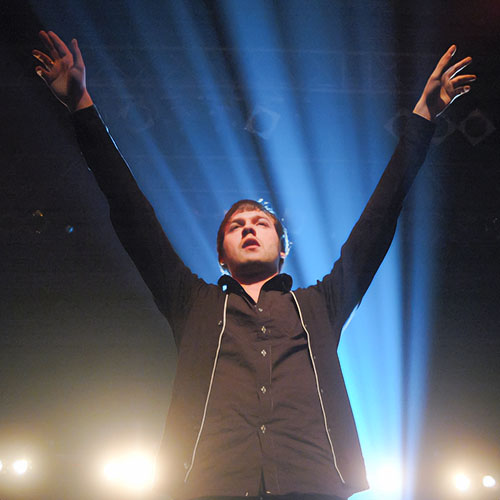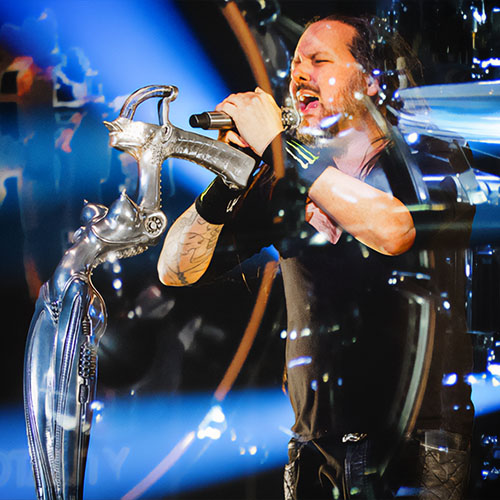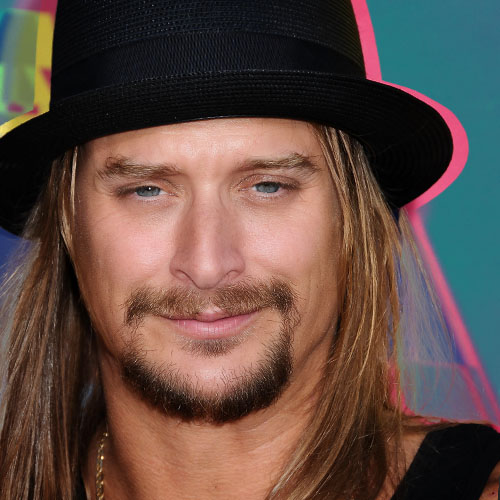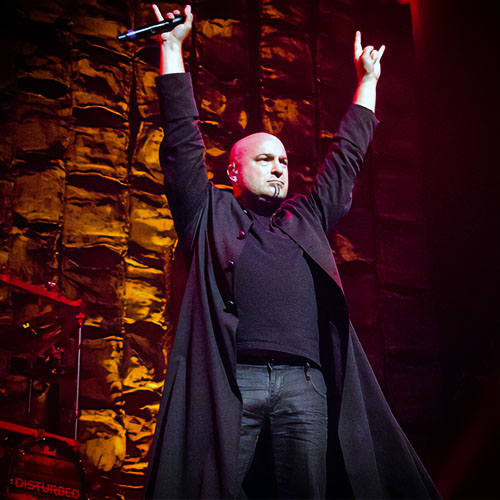They thrive on turmoil they give a shit about the war. They’re down with Michael Moore. But don’t write off System of a Down as another group of soap-box happy rockstars — strip away the politics, and their just trying to make hard rock fun again.
Cracking the System of a Down
Daron Malakian is either overwrought with emotion or incredibly stoned. Actually, he’s both. Hunched over in an enormous wooden chair and staring wide-eyed at the floor, the guitarist and chief music writer for System of a Down has been puffing heavily on a confetti-colored glass pipe since arriving at the Los Angeles photo studio in his sleek black Hummer. As he mindlessly mashes huge buds with the corner of a disposable lighter, an impromptu band huddle commences.
With two albums hitting stores this year — Mezmerize in May, Hypnotize this fall — the biggest hard-rock band on the planet is buried beneath decisions beyond what most young musicians can dream. Will they play a one-off show in Fiji before the start of their world tour? Which press photo do they prefer? Have they read any of the video treatments?
At this moment, it’s the video that elicits the most debate. Singer Serj Tankian pulls up a chair next to Malakian and muscle-bound drummer John Dolmayan joins the discussion. If Malakian is the recluse musician and Tankian the enigmatic front man, then Dolmayan, clad in a tight sleeveless T-shirt and pinstripe pants, is the band’s tight-lipped straight shooter. “The label e-mailed me treatments for the video. I just erase them,” says Dolmayan.
“They don’t all stink,” Malakian contends, unconvincingly.
The members of System of a Down are notoriously skeptical of anything outside their immediate circle, the result of their beginnings as outsiders in L.A.’s rock scene. Regarded as oddball Armenian kids with a bizarre cult following, they watched a parade of less-popular/more-marketable bands saunter past them to record contracts. To protect themselves, they learned to keep the group’s inner workings locked away in back offices and rehearsal rooms. Now, suddenly aware that they are discussing business in front of makeup artists, photographers, assistants, and one journalist, they do what they can to close the door: They speak in Armenian.
The chatter is broken by the arrival of Shavo Odadjian. Once the group’s manager, he is now their bass player and public personality. With his bald head and foot-long braided goatee, he’s the face leering out from the group’s videos, most of which he directed. He only stepped aside when System hired Michael Moore for their song “Boom!” Striding through the door an hour late with a sack of ln-N-Out burgers and a few of the band’s neighborhood friends in tow, he joins the debate. After a few minutes, English breaches the surface. “So you’re thinking Dawn of the Dead meets a hip-hop video?” Odadjian asks Malakian while tearing into his sandwich.
“I hung out with gangsters. I used to fight a lot and get drunk.” – Daron Malakian (Song writer, guitarist, second vocalist)
“Yeah. With some Creepshow thrown in.”
Everyone laughs and nods. Malakian knocks his pipe on the edge of the oak table like a gavel, signaling that a decision has been made. Zombies and hip-hop guys it is.
In the late nineties System of a Down stormed the L.A. Strip like a military detail, hitting the clubs with all the requisite parts in place: rabid fans, a distinct personality, a unique sound. It was prog rock on speed, with bits of metal and punk crashing into intricate breaks and Middle Eastern grooves, all packed into three-minute songs. No one saw them coming.
“We came from such a left place into the scene,” Tankian recalls. “We were very isolated. When we came to the clubs, people were like, ‘What are you guys?’”
The band that would become System of a Down began as four boys who attended the same private Armenian grade school but didn’t know one another until their late teens. They’re from across the globe. Tankian and Dolmayan came from Lebanon, Odadjian from Armenia. Malakian was born in Hollywood.
Malakian met Tankian when the two shared a rehearsal space with their respective bands. They formed Soil and enlisted Odadjian to be their manager. For all of System of a Down’s weirdness, Malakian and Tankian say that Soil was even more bizarre. “It was heavier and not as listenable,” Tankian says with a laugh. “Choruses would enter the songs and never find their way back.”
They experimented. Malakian was convinced that he could condense all of the band’s sounds into concise three-minute pop songs. They suffered lineup changes. Odadjian moved from manager to bassist, and they recruited Dolmayan for drums. As they went to work in a small industrial space in L.A., it was only then that they realized they were a completely Armenian band.
At the time, Tankian, who holds a degree in marketing and ran his own software company (“a vertical modular accounting system for the jewelry industry,” he explains), rented the space. It was his office, the band’s rehearsal area, and his living quarters. “I worked in the office, took the tie off and rocked, got some sleep, and did it again,” he remembers.
“Even if no one likes us. We have to rock.” – Serj Tankian (Vocalist)
The space soon became the prime hangout spot for the band’s friends. “Every night after rehearsal, people would come and just hang,” says Malakian. “If we had a new song, we’d play it for whoever showed up.” Songs such as “War?” and “Sugar” (the band’s first hit) were given trial runs at these late-night bashes.
The boozy post-rehearsal parties built a following for the guys long before they hit the clubs. Friends brought friends and word spread through L.A.’s Armenian community. By the time the band played its first gig, a sizable fan base had formed. That first gig, booked at the Roxy on a Tuesday night, was on a bill filled with ska bands. It was also, coincidentally, May 28-Armenian Independence Day. In lieu of payment, the band was given tickets to sell. They sold those and requested more. The show was a sellout.
That night kicked off a string of sold-out club shows. Kids lined the street to see a band that wasn’t on the radio and didn’t have an album. Record labels came and offered unsolicited advice: Tell the singer to scream less, tell the singer to sing more, write hookier songs, lose the singer. What should have been a young band’s meteoric rise to stardom turned into a two-and-a-half-year stint as System became the Sunset Strip’s biggest band — and the only one without a record deal, with labels hesitant to take a chance on four Armenian guys playing political prog rock.
“It was hard to believe,” says Malakian. “There were bands that got record deals who didn’t draw like us and weren’t as interesting. We knew we were doing something right. Someone had to pay attention to us eventually.” They day-dreamed about recording an album. “Shavo and I sat in his Honda Civic and talked about how this was the band we wanted to form and put out the kinds of albums that we wanted to hear but couldn’t buy at record stores. Shavo said, ‘We can get Rick Rubin to produce it!’ I told him, ‘Whoa, Shavo. Slow down!’”
But Rubin came. The man behind the Red Hot Chili Peppers, Slayer, and the Beastie Boys caught System at the Viper Room. He later claimed he laughed the entire time. He understood the band’s references and their sense of humor. He signed them to his label, American Records, produced their debut album, and put them on the road with Slayer. It was a veritable boot camp for the young band.
“Slayer fans hate you no matter who you are,” says Tankian. “Playing for them taught us that even if no one likes us, we have to rock. And if they hate us, we have to rock even harder.” They stuck to it, winning over crowds at Ozzfest and landing a surprise radio hit with “Sugar.”
“The Label e-mailed me treatments. I just erased them.” – John Dolmayan
When they went to work on Toxicity, their follow-up album, things became volatile. They literally battled through the making of it, and the war has etched a scar into Malakian’s lip and another into Dolmayan’s head. “We went to the hospital together and got stitched up side by side,” says Malakian.
The buzz around the band’s new album began to build. A free Labor Day concert escalated into a full-scale riot when the expected 2,000-person crowd swelled to nearly 12,000. The group, shut down by the fire marshal and prevented by the LAPD from announcing the closing, watched in horror as fans pilfered their equipment and clashed with police. “[LAPD] waited until the audience got crazy under that sun, then they came in legions and did what they do best — which is not talk,” Tankian recalls.
A week after Toxicity was released, debuting at No.1 on the Billboard charts, the World Trade Center was attacked. During the post-9/11 witch hunt, the media pounced on Tankian and branded him un-American after the singer posted on the band’s Website a statement titled “Understanding Oil.” The message was removed, but that didn’t stop the band. Instead, they hit the campaign trail. They organized a concert to commemorate the Armenian genocide and became heavily involved in anti-Bush protests. Suddenly the musicians who claim to be no more political than the Beatles found themselves labeled as activists for a new generation. They didn’t like it.
Seated in a corner booth at a nondescript Mexican restaurant just off the L.A. Freeway, Tankian’s appearance is anything but rock star. With his slight accent and soothing demeanor, he comes across more like an author or college professor. He speaks authoritatively on politics — world and personal — and contemplates questions before answering them. It’s easy to understand why Tankian is the member that fans approach with their political concerns. He’s engaging, leans across the table to make a point, and laughs frequently. He has an absurd sense of humor. When I ask him where he was when the election results were rolling in last November, he answers excitedly, “I was at Rick’s house in the studio recording vocals for the song ‘Tentative.’ The chorus says, ‘We’re going down in a spiral to the ground / No one’s gonna save us now / Not even God.’” Then he breaks out laughing.
That sense of humor is what saves System of a Down from the one-dimensionality of other bands. They continually flail against the egos of political leaders. They joke about buying crack and smacking up their bitch “right here in Hollywood.” On “Cigaro,” a track from the new album, Malakian’s falsetto snaps, “My cock is much bigger than yours.” Rage Against the Machine never had this much fun.
“So you’re thinking Dawn of the Dead meets a Hip-Hop video?” – Shavo Odadjian (bassist)
But for all of System of a Down’s explosive energy, it’s difficult to provoke Tankian into a political tirade. The group prefers to leave its message open to interpretation, and Tankian claims to not be concerned if the crowd embraces the group’s politics. “It’s hard to expect things from people on a mass basis,” he says. “I just hope that whatever we do has positive results.”
When I press him for a rundown of the band’s political agenda, the singer espouses vague statements like “I think we’re conduits to the universe if we do our art correctly.” I push a second time and he responds, “I think the best musician is no more than an amazing presenter of something beyond him — or herself.”As the waiter refills our glasses with iced tea, I approach the topic a third time. Tankian cracks it open a bit: “Social injustice wasn’t created by a president or a body of politics. Every type of injustice, be it economic, social, or political, was created over time by mistakes and misleading ways.”
We take a break from politics to discuss his love for New Zealand and his distaste for TV. The television he owns is hooked up only to a VCR and a DVD player so he can watch movies, including those of his current favorite director, Akira Kurosawa. “I haven’t watched TV in so long that if I go to a friend’s house, I’m hypnotized by it. I can’t have a conversation,” he says.
Broaching politics again, I ask him if he would consider performing for U.S. troops in Iraq. He fires back, “I would love to play for the troops over there. Those are my people. My people are not just Armenians. My people are not just Americans. They’re also Iraqis. If I played for the troops, I would like to play for the Iraqis as well.”
Reflecting on his involvement in anti-Bush protests, in which he worked with former Rage Against the Machine/current Audioslave guitarist Tom Morello, Tankian is generally surprised by the number of young bands that got involved, but realistic enough to realize that most of those bandwagon activists have probably moved on since. “It was a social and cultural movement. Of course it became fashionable. Maybe some of those bands went back to writing about girls, but I think it made an impact.” But doesn’t he worry that a band singing about politics cheapens the issue, turning it into radical chic? After all, it’s easier to sell radical politics to kids than, say, Social Security reform. Can it really make a difference?
Fiery now, he leans forward, pointing at the table to emphasize his words. “I’m not going to depend on some guy in the White House to make a change. I need to make that happen along with you, my community, and my friends. I’m not going to depend on the president to get Congress to recognize the Armenian genocide or fix Social Security or pull the troops out of Iraq. It’s up to me. If I can’t inspire and be inspired by people around me to make positive change, then maybe I deserve a dickhead for a president.” Finally the dam has broken.
“When we came to the clubs, people were like ‘What are you guys?’”
Malakian, though he seems to agree with Tankian, isn’t the political one of the group. “I don’t care very much. I don’t have anything against George W. Bush. It’s like going to Disneyland, getting hurt on a ride, and complaining to Mickey Mouse.” Malakian is the group’s musical visionary. The guitarist was raised in a one-bedroom apartment by a sculptor mother and a painter father, and he introduced music to the System household. “When I was born it felt like, here’s your mom, here’s your dad, here’s music,” he says. “My parents weren’t music listeners. I dragged my mother to the record store.”
Convinced he was born to be a drummer, he begged his parents to squeeze a drum set into their tiny apartment. They settled on a guitar when he was nine, but his father smashed it after a fight with his mother. “It wasn’t cool,” he says, laughing. It would be another three years until he received his first real guitar. “We moved into a house big enough for drums, but my parents didn’t want to buy them because you couldn’t turn them off.”
Yet for all his musical ambition, Malakian showed little interest in the L. A. rock scene that existed just blocks away. He attended few concerts, mostly arena shows of bands like Iron Maiden, but didn’t set foot in the legendary Whiskey until he was 20, and never sought out other musicians. “I hung out with gangsters. I used to fight a lot and get drunk,” he says. Fed-up school counselors confronted Malakian, provoking what he refers to as his “Twisted Sister moment.” “They sent me to a shrink who said, ‘You ditch school, you get into fights, and you get straight F’s. What do you want to do with your life?’ I told them I wanted to play music. I always knew that I wanted to start this band.”
Malakian says he was a “bum,” living off the $10 a day doled out by his parents. He didn’t move out until his mid-twenties, long after writing Toxicity. He spends most of his time holed away at home among his various collections (seventies porn, World War II memorabilia, skulls, and swords, to name a few), writing nearly all of System of a Down’s songs and arranging the few tracks brought in by other band members. When the band talks about going to Fiji to play a single show, he answers simply, “I don’t want to go anywhere,” and laughs to himself.
Over the past year he has been especially prolific. He composed more than 30 songs, which the group attempted to cut down to 12 for an album. Working with Rubin, they realized that they had enough material for a double album but decided against it. “I listened to 30 songs in a row and I thought I was going to pass out,” Tankian says.
Deadlocked, the decision was made to release two albums six months apart with artwork by Malakian’s father. When asked what inspired this outpouring of material, Malakian is elusive: “I was in a zone. I put myself in that zone when I need to be distracted from things. I need to be distracted from things like the war. I have family in Iraq, so it’s hard to sit there and digest what’s going on. I’m just lucky to have an outlet like music to run away to and still use it to express how I feel. It brings the best out of me.”
After listening to the songs they’ve been working on, it’s easy to see why the band struggled to choose just a dozen. This is System’s strongest material yet. Malakian is able to shift between complex Armenian folk-music melodies and chugging metal riffs like no other songwriter could. The hyperspeed jumps between galloping metal verses and mellow choruses seem smoother and the harmonies stronger than in previous work, and Malakian sings more than ever. “Kill Rock ‘n’ Roll” grooves in a way that Malakian describes as “old Motown,” and “BYOB” bounces through the chorus “Everybody’s going to the party to have a real good time” like a summer hip-hop jam. Drummer Dolmayan can play anything. He pounds out time like Metallica on “Revenga,” blasts through the punk breaks of “Attack,” and lays back during the mellow “Lost in Hollywood.” On “Hypnotize,” they dreamily sing of waiting in the car for a girl while thinking, “Why don’ t you ask the kids in Tiananmen Square / Was fashion the reason they were there?”
“It gets to me when people pigeon-hole us as a political band,” Malakian says. “We just express our opinion. We’re expressing that part of the world as much as we express love, hate, drugs, chicks, and drive-through windows. System of a Down is limitless in the things that we sing about. We aren’t stuck on being a heavy band or a political band. We play heavy, then soft, then funk, because we love all of that. This time we took it even further. How can I really make all of this speak as one?”
The photo shoot ends and the members of System of a Down mill about discussing T-shirt designs and other business, mostly in Armenian. They joke about the similarities between Armenian men and the Borat character from Da Ali G Show, depicted on Tankian’s shirt. A friend discusses a new sword for Malakian’s collection. Dolmayan is rounding up other friends for a trip to Vegas. He’s a poker player with a new passion for tournaments, and recently came in 50th out of 300 at one. Odadjian jokes around while gathering up his wardrobe, including a knee-length pimp jacket. Tankian talks with publicists and more than once stops by to make small talk. Only Malakian seems impatient to split. Standing in the doorway with his keys ready, he implores his friend to hurry up. Then he climbs into his black Hummer and disappears back into the streets of L.A.
One of the VIP people at Penthouse was apparently in the audience during the filming of this video created by a spin off group from System of a Down using the name Scars on Broadway. Consequently you will see us being very polite here as we offer the web site, Instagram, and YouTube links for this very fine originating band. You will not hear us questioning anyone’s use of the English language — even in their name — or saying anything at all about how thrilled some of us were that this very fine and elegantly named musical group provided close captions for that song. … (It was a song, right?) … Nope. All peach ice cream, sunshine and roses for us here today, with nary a pun in site. One messes with the Senior Inovation Officer at one’s own peril, you see.
























